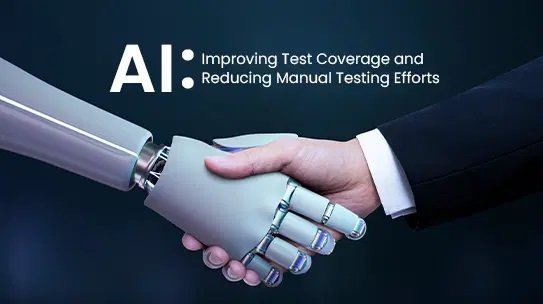Testing software through the use of Artificial Intelligence (AI) is accelerating because businesses tend to simplify their testing, ensure accuracy, and save costs. AI testing can enhance traditional testing by automating activities or predicting potential defects and providing deeper insights.
How AI Revolutionizes Software Testing?
AI is improving software testing in a number of ways, from speeding up the process of software development to faster debugging.
Let’s take a look at how AI is improving testing:
- Test Automation
AI-powered automation significantly speeds up the testing process by automating test execution and creation. Machine learning models can analyze previous tests and optimize the entire test cycle, making it faster and more reliable. This approach improves both the depth and breadth of testing while reducing human intervention.
By learning from prior tests, AI can prioritize and generate tests more efficiently, increasing productivity and ensuring thorough coverage.
- Self-Healing Scripts
Maintaining automated test scripts can be challenging, especially when an application undergoes frequent updates. AI-driven self-healing scripts automatically adjust to changes in the application, such as UI updates, without the need for manual intervention. This results in fewer test failures and reduces the time spent maintaining test cases.
Self-healing capabilities allow teams to focus on new features or more complex tests rather than dealing with broken scripts.
- Predictive Analysis
Predictability can be done by AI while understanding old data and predicting what could happen in the future. Knowing possible risk areas of the application in advance, AI sets forth teams to test the parts that are most important about that software first. It actually saves time and detects failures early in the cycle.
Predictive analysis helps to ensure that potential failures are caught before they impact end users, improving overall software quality.
- Visual and Functional Validation
AI is particularly adept at visual testing, comparing screenshots of applications across different platforms and devices. Using advanced image recognition, AI can spot visual inconsistencies and functionality issues that manual testers might miss. This ensures that the user interface is consistent and functions correctly across various screen sizes and resolutions.
AI-driven visual validation also helps in ensuring that UI elements are correctly aligned, providing a seamless user experience.
Key Applications of AI in Software Testing
AI enhances many facets of the testing lifecycle, enabling more effective strategies that lead to higher-quality products. From performance testing to test data generation, AI has become a valuable asset in improving testing efficiency.
- Performance Testing: AI can also optimize performance testing by simulating real-world scenarios and predicting the way the software would perform in different conditions. Analysis of patterns from past tests shows performance bottlenecks early to ensure that an application scales effectively.
- Regression Testing: AI aids regression testing by learning which features are most likely to be impacted by new changes. It can then prioritize the relevant test cases, reducing the number of tests required while maintaining full coverage.
- Test Data Generation: AI generates realistic and diverse test data automatically, which helps simulate real-world conditions. This data is crucial for testing complex scenarios, especially when dealing with large datasets or sensitive information.
- API Testing: AI enhances API testing by automatically generating test cases for edge cases and analyzing the behavior of APIs under different conditions. This allows for faster, more reliable testing of APIs without human intervention.
Benefits of AI in Software Testing
The adoption of AI in software testing has introduced many benefits, such as speed, accuracy, and efficient use of resources. Thus, the adoption of AI will enhance the efficiency and effectiveness of an organization’s testing process.
- Speed and Scalability
AI-powered tools automate many testing tasks, which significantly reduces the time required for testing. This enables faster release cycles and the ability to handle more tests simultaneously, allowing teams to scale their testing efforts as the software grows.
Additionally, AI can parallelize testing across multiple environments, which further accelerates the testing process and reduces time-to-market.
- Accuracy and Reliability
AI reduces human error by automating test execution and validation. With the capabilities of AI in analyzing vast amounts of data, it can detect and analyze patterns and anomalies that human testers might miss. This leads to more reliable and accurate test results, contributing to higher-quality software. The accuracy of AI-driven tests increases as the system learns from past mistakes, ensuring continuous improvement over time.
- Resource Optimization
AI automates repetitive tasks, thereby opening up more complex and creative fields of testing to human testers. Manual tasks take less time, thus reducing the idle time of organizations and optimizing resources toward improved productivity of a testing team. These AI testing tools reduce the cost of testing by minimizing the extensive manual intervention whereby, as a result, such applications also reduce labor and maintenance costs.
- Enhanced Test Coverage
AI expands test coverage by automatically generating test cases for a wide range of scenarios, including edge cases that might not be considered in traditional test scripts. This comprehensive testing approach helps ensure that all potential issues are identified before they impact users.
AI tools can intelligently select the most relevant tests to execute, improving coverage without the need to run every possible test case manually.
Challenges in Adopting AI for Testing
Despite its many benefits, integrating AI into software testing can come with challenges. From the cost of implementation to data dependency, here are some of the key hurdles organizations may face:
- Data Dependency
AI works effectively when large, high-quality datasets are used. In case the data used in training AI models is incomplete, biased, or of low quality, then AI tools will give wrong predictions. Therefore, clean, relevant data is the most important factor when it comes to giving appropriate insights by AI. Without enough data, AI models may not predict defects correctly, which may lead to false positives or missed issues.
- Cost of Implementation
The integration of AI into the existing testing workflows often demands an upfront investment in terms of money, time, and resources. Organizations have to invest in AI tools, infrastructure, and training for their teams.
Such long-term advantages of AI adoption may balance these costs with savings in terms of shorter testing cycles and higher accuracy. However, smaller companies or teams with limited budgets may find it difficult to justify the initial investment.
- Integration Hurdles
Introducing AI into an established testing framework requires technical expertise and careful planning. AI tools must be integrated with existing tools and workflows, which can be complex and time-consuming.
Teams must ensure they have the necessary skills and knowledge to implement AI tools effectively. Additionally, the integration process may require significant adjustments to current testing practices.
Top AI Tools Transforming Software Testing
Several AI-driven tools are helping organizations leverage the power of AI to enhance their software testing processes. These tools are designed to automate and optimize different stages of testing, from test creation to execution and validation.
KaneAI
KaneAI by LambdaTest leverages AI to optimize test automation, offering features like intelligent defect detection and predictive insights. It helps teams automate tests more efficiently while prioritizing high-risk areas. LambdaTest is an AI-powered test execution platform that allows you to run manual and automated tests at across 3000+ browsers and OS combinations.
Key features:
- AI-driven test recommendations
- Predictive insights for early defect detection
- Enhanced reporting and analytics
Katalon Studio
Katalon Studio is an all-in-one test automation platform that uses AI to automate the testing process. It provides a comprehensive solution for web, mobile, and API testing, enabling teams to automate testing with minimal effort.
Key features:
- Automated test case generation and script maintenance
- Detailed reporting and analytics
- Integration with CI/CD pipelines for continuous testing
Function
Functionize uses AI to simplify the test automation process by providing self-healing capabilities and intelligent test creation. It allows teams to automate complex tests without requiring extensive programming knowledge.
Key features:
- Self-healing test scripts
- Visual testing for UI consistency
- AI-driven test prioritization and execution
Applitools
Applitools is known to offer Visual AI technology to automate visual validation for web and mobile applications. It catches UI issues that testing personnel may miss while doing a manual test.
Key features:
- Pixel-perfect visual validation
- Cross-platform compatibility
- Seamless integration with popular test automation frameworks
Future of AI in Software Testing
AI will continue to play an increasingly vital role in software testing as technologies evolve. From enhancing the accuracy of testing to improving automation efficiency, AI’s influence on the testing process is set to grow. As more sophisticated AI models emerge, the potential for even greater automation and predictive testing capabilities is immense. With the continuous advancement of AI technology, software testing will become faster and more reliable.
Conclusion
AI is certainly enhancing software testing, making it more efficient, faster, and accurate at various stages of the software development lifecycle. AI allows the testing teams to focus on higher-value tasks by automating repetitive tasks, providing predictive insights, and ensuring more comprehensive test coverage.
With challenges remaining, such as integration and tool compatibility, there is no denying the value that AI brings to software testing. With advancing AI technology, its effect on quality assurance will only grow deeper, giving more room for innovation and improvement in software development practices. It is not an option but a strategic need for organizations looking to develop software at an accelerated pace.



